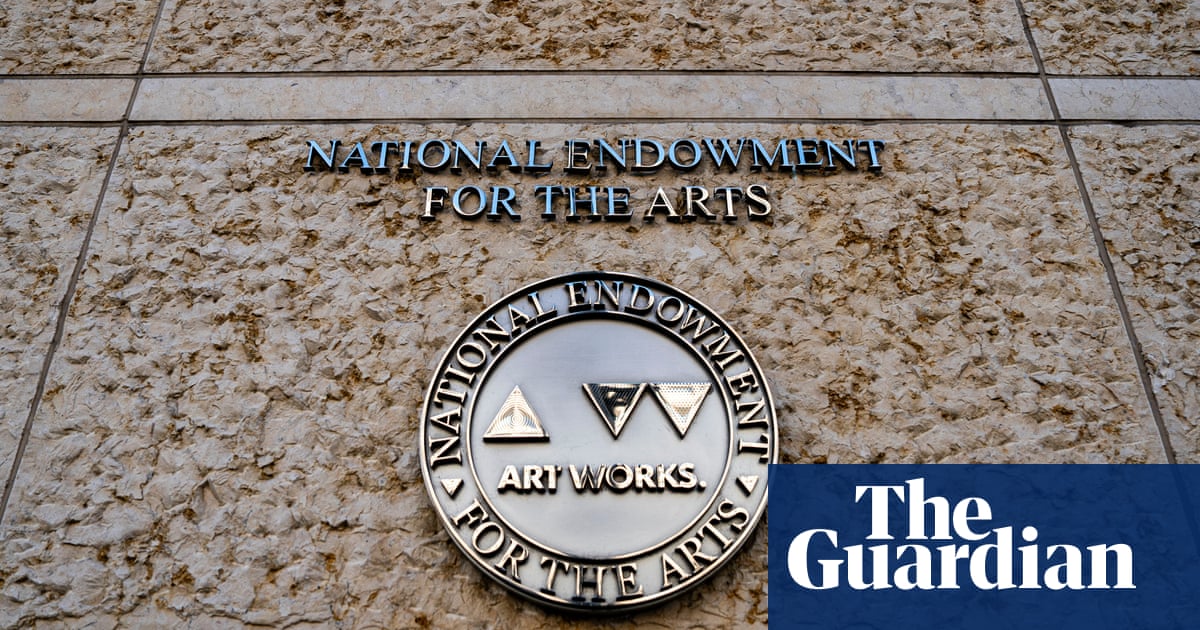Dozens of US arts organizations have been notified that offers of government grants have been terminated, hours afterDonald Trumpproposed eliminating federal agencies that support arts, humanities and learning.
The cancellation of grant offers were reported from organizations across the US, including a $25,000 offer to a playhouse in Portland, Oregon, hours before the opening of a new production, August Wilson’s Joe Turner’s Come and Gone.
On Friday, Trump proposed eliminating several learning and arts-orientated agencies, the National Endowment for the Arts (NEA), the National Endowment for the Humanities (NEH), and the Institute of Museum and Library Services, as part of the administration’s2026 discretionary budget requestthat is in essence a White House wish-list.
The federal agencies were listed under “small agency eliminations” and their cancellations, the document said were “consistent with the president’s efforts to decrease the size of the federal government to enhance accountability, reduce waste, and reduce unnecessary governmental entities”.
The proposed eliminations come after both the NEH and NEA moved to cut costs and staffing in compliance with earlier directives to reduce the federal workforce and shut down diversity, equity and inclusion (DEI) programs.
An email sent out to arts organization administratorslate on Friday said the NEA was updating its grant making policy priorities to focus funding on projects that “reflect the nation’s rich artistic heritage and creativity as prioritized by the president.” NPRreportedthat the email was sent from a generic “arts.gov” address.
The email also said,according to numerous US media reports,that the endowment would favor projects that “elevate” historically Black colleges and universities, and colleges that serve Hispanic students.
It said it would also focus on projects that: “celebrate the 250th anniversary of American independence, foster A.I. competency, empower houses of worship to serve communities, assist with disaster recovery, foster skilled trade jobs, make America healthy again, support the military and veterans, support Tribal communities, make the District of Columbia safe and beautiful, and support the economic development of Asian American communities.”
However, numerous media reports showed that the cuts would hit at projects that included those aimed at communities of color.
The proposed budget plan also includes cuts in support to public broadcasters and conforms to efforts by the president during his first term to see government support of the arts and humanities endowments eliminated.
Democrats politicians and arts unions said the cuts would be disastrous to public access to creative expression.
“The NEA is essential to our livelihoods and our democracy,” The American Federation of Musicians posted on X. “Without it, communities across the country, both rural and urban, will lack access to arts participation.”
The proposals provoked a sharp reaction from Democrats.
Rhode island senator Jack Reed vowed to fight the plan to eliminate the NEA “tooth and nail”. Maine representative Chellie Pingree, told the New York Times that Trump was “making a broad-based attack on the arts … they’re in no mood to keep much of government alive anymore, and their attack is focused on everything, and the arts have already got a bull’s-eye on their back.”
Support through NEA grants is considered vital to smaller arts organizations and used a seal of approval to attract support from private organizations or donors. The NEA, with a budget of $207m last year, had already seen its funding slashed and had announced it would only accept grant applicants that would not be used to promote “diversity, equity and inclusion” or “gender ideology”.
Brian Weaver, artistic director of the Portland playhouse,told the New York Timesthat the loss of its grant offer was “ridiculous”.
“It’s strange that theTrump administrationis trumpeting their priorities to serve diverse America while canceling grants for our August Wilson play,” Weaver said, referring to the Black author of the play.
Other organizations that said they had received similar notices of grant offer cancellations include Yale’s repertory theater in Connecticut; Indianapolis’s writing group, the New Harmony Project; the American conservatory theater in San Francisco; and the Civilians, a New York-based theater company.
Kate Fowler, a director at Studio Two Three, a community arts space in Richmond, Virginia, said the organisations’ $30,000 grant had been cancelled.
“Absolutely furious,” Fowler wrote onInstagram: “The long-arm strategy to federally divest from community organizations is not incidental. These are the places where communities gather, dream and scheme. This is where we build, envision and create community-level change.”
